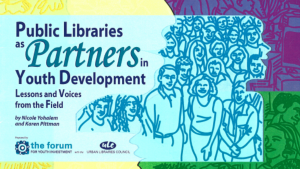
If we are a profession, what do we profess? And what are the implications for training? These were the questions asked of the 150 youth workers gathered in South Africa in late March to discuss a national youth work policy. Equality, opportunities, empowerment, self-determination were the answers to the first question. Youth work, they concluded, is about living with youth and modeling a way of life — influencing young people, demanding greatness, building relationships, modeling principles, creating opportunities, encouraging and allowing leadership and empowerment. Of equal importance, it is about creating places, spaces and opportunities for young people to practice and reap the benefits of that way of life.
This statement is similar in spirit to one agreed to at the national conference of youth workers in Great Britain in 1991: “The purpose of youth work is to redress all forms of inequality and to ensure equality of opportunity for all young people to fulfill their potential as empowered individuals and members of groups and communities…”
Redress. Ensure. Fulfill. These are action words that link youth work to youth, not to youth organizations. Words that demand that youth workers be prepared to work with youth in ways that are participatory, educative, respectful and promote equality. They also demand that youth workers be prepared to work with and sometimes argue against the practices and policies of organizations, institutions, communities and governments that limit youth opportunities. They suggest that youth workers are not only skill builders but community builders, advocates and change agents.
Youth work, at its best, is just that — work with and for youth. Anyone — teacher, police officer, health practitioner, minister — who is committed to allowing and assisting young people to chart the path and scope of their relationship is doing youth work. But this approach, is so important that there should be adults whose job it is to establish these type of relationships with youth. Allowing young people real opportunities for participation, responsibility and choice within relationships, organizations and communities – and working to create them when they do not exist – is the essence of
youth work. These skills and passions do not come naturally to many adults. Trained youth workers are needed.
Youth work training in the U.S. has progressed measurably. There is now widespread recognition that 1) it is needed; and 2) it should be developmentally not programmatically focused. And there is measurable action on these fronts. But training is still primarily focused on refining and deepening a holistic approach to working with young people. Training to redress and ensure requires training not only in youth development, but in organizational change, community development, family support and social issues. Training should, at least in part, be independent of the organizations within which youth work occurs. Youth workers need avenues — associations, networks — to meet, learn and plan
outside of their organization.
I urge us all to reflect on the wise statement of one of the South African youth work delegates. “We cannot help young people become generators if we ourselves are batteries.” Youth workers have to be about change, not just knowledge and skills transfer.
If we think about youth workers as batteries — storers of support for youth to draw upon — then we are likely to conclude that we don’t have the resources to charge them all fully. The advancement of the field is hindered by the fact that youth organizations are undervalued and under funded, youth workers unevenly prepared and underpaid, and youth — especially those in need of redress — underutilized and under attack.
But if we think of youth workers as generators — catalysts of energy and action — we may reach a different conclusion. Acknowledge all of the above and focus on training as the primary vehicle for changing not only the practice of youth work, but the status of youth organizations, and the opinions of public and policymakers, and the opportunities for youth.
We welcome your contributions to the topic. Please reach out to talkwithus@kpcatalysts.com if you’d like to join to the discussion.
Article was originally published in

Pittman, K. (1996, July/August). “Generators or Batteries?.” Washington, DC: The Forum for Youth Investment. A version of this article appears in Youth Today. July 1, 1996



No comment yet, add your voice below!